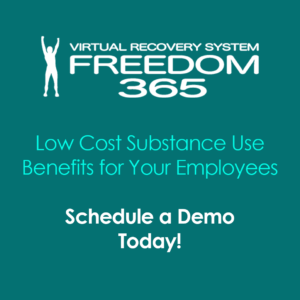How companies can support employees with substance dependencies
(This article originally appeared on www.benefitspro.com) 
by Daniel N. Jolivet
-
COVID-19 has caused an increase in alcohol and drug use among Americans, which will take a toll on employee productivity.
-
Data show that Americans are drinking more during the pandemic, with alcohol sales increasing since government stay-at-home orders were initiated in March 2020.
The American workforce is changing rapidly in the face of challenges caused by the COVID-19 pandemic, including workers consuming more alcohol or using drugs in excess. Long-term, valued employees may develop substance use problems under the stress of the past year, and those with existing conditions may be getting worse. This may lead to workplace problems, such as decreased engagement, productivity, work quality and teamwork.
Related: Mental health, substance abuse driving health care costs
Employers, though, can help. While they may have a legal obligation to provide reasonable accommodations for workers with substance use conditions, it is in an employer’s best interest to support employees, too.
Rising use of substances 
Data show that Americans are drinking more during the pandemic, with alcohol sales increasing since government stay-at-home orders were initiated in March 2020. More than 40 states have also reported an increase in their opioid-related deaths since the pandemic began, and there are numerous indicators of increased drug use as well.
These statistics suggest that companies may experience a higher rate of substance use conditions among their employees and a corresponding impact on the workplace in the future. The major first major hurdle is how this is perceived. Supervisors and managers frequently do not know the signs and symptoms associated with substance use conditions, so they may not recognize when an employee is struggling with an addiction. Even when they do know an employee is dealing with a substance use condition, supervisors don’t know how to approach the topic with an employee or how to accommodate an employee who requests support for an addiction.
Addictions are chronic, relapsing medical conditions. They are treatable and can be managed successfully through ongoing, active treatment, but they cannot be cured. Still, people with substance use conditions can and do recover, meaning that they are able to either abstain from or reduce their substance use to levels that do not impact their ability to function in other areas of their lives. Relapse rates for these conditions are similar to those for other chronic conditions, such as asthma, diabetes and hypertension.
It is beneficial for companies to recognize this, as the cost of accommodating workers with substance use conditions is actually much lower than the cost of replacing employees who leave. That retention likely includes valued, experienced people, who know the job and perform well, and are merely experiencing new substance use challenges, potentially brought on by the stress of the pandemic.
Determining employer responsibility
Legally, substance use conditions can qualify as medical conditions that meet the requirements for protection under the Americans with Disability Act, so employers cannot discriminate against employees based on a diagnosis (or even a perception) of a substance use condition. They must provide reasonable accommodations to allow those employees to fulfill the essential functions of their job.
That does not mean, though, that employers have to accept behaviors that are incompatible with their Drug-Free Workplace or other conduct policies. While an employee cannot be terminated solely because they have a substance use condition, they can be terminated for things such as using on the job or being too hungover to perform their duties.
In practice, this generally means that companies offer a reasonable accommodation in the form of a leave to allow the employee to obtain treatment for rehabilitation and recovery, once the employee has disclosed that they require such treatment. On the other hand, accommodations that are not focused on seeking treatment or recovery are usually not considered reasonable; employers do not have to find ways to accommodate employees who refuse to seek help or who relapse repeatedly.
In this context, it’s understandable why some companies struggle with questions about how to reasonably accommodate employees with alcohol or drug problems. As with mental health issues, these questions frequently reflect a basic confusion about behavioral health conditions and how employers can accommodate workers who are experiencing them. So a good place to start is with company benefits.
Employee benefits and resources 
Almost half of Americans are covered under employer-sponsored health insurance, which is required to include coverage for mental health and substance use conditions. Similarly, employee assistance programs, originally developed in the 1970s to address alcohol and drug problems among workers, have been shown to decrease absenteeism, turnover and medical claims. In addition to providing absence management programs and short- and long-term disability insurance, many disability insurance companies also provide case management, stay-at-work and return-to-work programs that include behavioral health professionals who can help identify appropriate supports and reasonable accommodations for employees dealing with alcohol and drug problems.
Reasonable accommodations are simply adjustments to the specific work setting or processes that allow the employee to perform the essential functions of their job despite the limitations or restrictions caused by their symptoms. The key to designing these supports is to explore the barriers the worker experiences in doing their job. The process must start with input from the employee and their treating provider, and the reasonable accommodations must then be individualized.
In addition to leaves to complete treatment, the most frequent accommodations requested by employees with substance use conditions are related to scheduling. Many treatment providers require their clients with addictions to attend self-help groups such as Alcoholics Anonymous (AA) or Narcotics Anonymous (NA) that meet daily, limiting them to full-time work only to the extent they can attend meetings during specific breaks.
Cognitive or emotional issues, such as difficulty concentrating, problems with decision making, and poor stress tolerance, are also common. Employees who have difficulty focusing or making decisions may benefit from adaptive equipment to reduce distractions (such as noise-cancelling headphones, office doors, sound-absorbing panels or white noise machines). Workers with poor stress tolerance can be helped with flexible scheduling or job restructuring to reduce interactions with specific coworkers, or with a modified break schedule that allows them to walk away from situations before they become overwhelmed. These strategies work to mitigate limitations and restrictions associated with the symptoms, and not the condition itself.
Ultimately, while Americans were struggling with the impact of addictions prior to the onset of the pandemic, COVID-19 and the efforts to contain its spread have significantly increased the problem, with many turning to alcohol or drugs to cope. Those problems inevitably spill over into work, especially now that work has literally moved into people’s homes. Recognizing the signs of a problem, approaching employees appropriately and implementing support systems to help is likely to be a significant challenge for companies in the coming months. In some cases, there are legal requirements for the employer to act, but, in every case, there is an opportunity for companies to assist in a way that can help retain valued employees, hopefully leading to a more productive and inclusive workforce.
Disclaimer: The terms alcohol and drug use, substance use, and addiction are used interchangeably in this article and are applied even when the person has not sought treatment or received a formal diagnosis by a healthcare professional. The term Substance Use Disorder is used for any such condition that has been formally diagnosed by an appropriate healthcare provider in compliance with the most current diagnostic criteria applicable. This article is for informational purposes only and not for the purpose of providing legal advice. Employers should discuss their ADA obligation and accommodation requirements with their legal counsel.
Daniel N. Jolivet, Ph.D., is the workplace possibilities practice consultant at The Standard, where he provides leadership, analysis and consultative insights into the Workplace Possibilities service line. He is a designated subject matter expert on Stay at Work and Return to Work services, ADA, and behavioral health. He is a clinical psychologist licensed in Georgia and Oregon, and has worked in behavioral health since 1980. Prior to joining The Standard, Dan worked in managed behavioral health care organizations for 20 years in a variety of management roles, and he was in clinical practice as a child psychologist until 2003.



